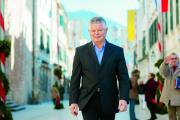Brugge
Belgium
Mayor of Dubrovnik, Croatia (November 2013)
Dr. Andro Vlahušić

1. The city of Dubrovnik was registered on the World Heritage City List in 1979. What has been the impact of this nomination for your city?
The impact, in my opinion, was self-confidence, as at the time it was important to know that the architectural creativity of our ancestors and our own legacy was recognised world-wide. Also, the touristic influence was significant, as being listed as a world heritage site suggests to everyone that Dubrovnik is a unique place that should be seen by everybody interested in heritage and history.
Further, the nomination helped us in the reconstruction and repair of the city after the 1979 earthquake and the war devastations of 1991.
2. In your opinion, what is the vital role of a mayor when a city has been inscribed on UNESCO’s World Heritage List?
Our role is to do everything we can to maintain and manage our heritage in a sustainable way. Of course, it is also a challenge, as it is sometimes hard to adjust old venues to the modern needs of our inhabitants, and to the technological and safety standards of entrepreneurial activities. Managing such dilemmas has high priority on the list of a world heritage city mayor.
3. Concretely, what have been your actions toward the protection and enhancement of your heritage?
Each year, a sizeable amount of the city budget is dedicated to the protection and enhancement of our heritage. We have been struggling to change legislation so that all institutions handling cultural heritage can come under the same roof – which will make them financially stronger and more efficient.
The city has currently undertaken the huge task of reconstructing a medieval quarantine known as Lazareti, in order to save it from degradation and to make it suitable for cultural events and civil society activities.
4. Do you hold special events to enhance the heritage in your city?
There is the “The Best in Heritage” annual conference, co-organized by the City of Dubrovnik, which has become an annual event in Dubrovnik. The Croatian Association of Historic Towns, which I founded during my last mandate, is based in Dubrovnik. The City of Dubrovnik, together with this civil society organization and the UNESCO Regional Bureau for Science and Culture in Europe in Venice, successfully co-organized an international conference, an international workshop and a UNESCO Regional School on sustainable energy over the past two years.
Of course, there are also numerous other events held in Dubrovnik, organized by different national and international institutions.
5. The motto of your city is Sloboda se ne prodaje za sve zlato svijeta which means Liberty is not sold for all the gold in the world. How do you think liberty is represented today in Dubrovnik?
It is represented through a warm openness towards all our guests, no matter where they are from and what their social status is. For our citizens, liberty is felt throughout the fabric of our lives from an early age, where society is immersed in creative cultural heritage, both tangible and intangible, and where our famous system of educational subsidies gives everyone an equal opportunity.
6. In your opinion, what makes Dubrovnik such a special place?
It is hard to say just what makes Dubrovnik such a special place, for there are so many aspects to take into consideration. However, from my view, it is a combination of many things – its incredible history of pride, liberty, tolerance and acceptance, but perhaps more importantly it is the untouchable legacy of the free-minded spirit of its citizens.
Document(s)
CV - Dr. Andro Vlahušić
News
Together towards the New Urban Project
Technical Assistance and Cooperation
Youth and citizens
Communication


